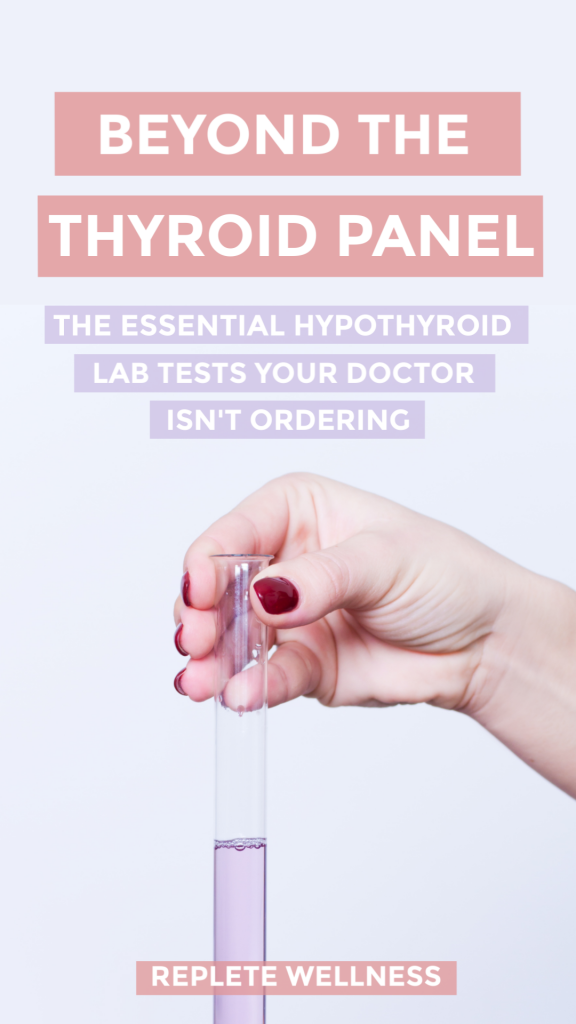Fertility Blood Tests: The Essential Tests You Need + What They Mean
April 15, 2019 By Sarah WhiteNo Comments

If you’re currently being treated for infertility then you already know that there’s a ton of blood work involved. My patients are constantly telling me that the most stressful part of their conventional fertility treatment is the blood draws & painful needles on multiple days of their menstrual cycles. While proper blood work is critical to diagnosing infertility issues, very few MDs have actually taken the time to sit down with my patients to explain what their results truly mean.
I also see an alarming amount of “unexplained infertility” cases where a patient’s fertility clinic has failed to run some very critical blood tests. Have you ever heard the saying “if the only tool you have is a hammer, you treat everything as if it were a nail”? This concept, unfortunately, applies to the standard model of fertility care in Canada. When you sign up to work a fertility clinic their “tool” is IUI and IVF, and their business model focuses billing you / OHIP for these expensive procedures. Many of my fertility patients come to see me after unsuccessful IUI & IVF procedures, and part of my job is to pour over their massive files of blood work to help them make sense of what’s going on in their body. While fertility clinics are great at running the blood work required to make sure that you’re a candidate for IUI & IVF, 90% of the time they leave out essential tests that make a huge difference when it comes to your ability to conceive naturally.
For example: I’m sure you’ve heard of the hormone progesterone. Progesterone = pro-gestation hormone, and adequate progesterone levels are crucial in order for you to maintain a pregnancy. I’m constantly surprised by the number of my patients that have been for hundreds of blood tests yet no doctor has ever looked at this essential reproductive hormone. I’ve also seen many fertility patients where a simple vitamin D test or ferritin level would have saved them years of unnecessary fertility procedures.
The other problem with fertility (blood) testing is that the reference ranges are absolutely massive. This means that it’s highly unlikely that your results will be deemed “abnormal”, even if they’re not within ideal range for conception. Today I’m going to break it all down for you. Consider this your lesson in fertility testing 101; everything you need to know about your test results and the ideal range you’re looking for. If your fertility doctor has not, or will not, run all of the these tests then I suggest either finding another clinic, or working with a naturopathic doctor who can run these additional tests for you:
Estradiol
Estradiol, along with LH and FSH, help your body to mature and release an egg. Adequate levels are also required to help you build up your uterine lining for implantation. Most of the women I see have way too much estrogen and not enough progesterone to support pregnancy. This is due to the fact that estrogens are so abundant in our environment through plastics, personal care products and the foods we eat. These estrogens are called xenoestrogens, and they can have negative impacts on your fertility.
Day 3 estrogens should be lower than 250 pmol/L and higher than 100 pmol/L. A level higher than 300pmol/L is a sign that your body is trying way too hard to stimulate egg development, and that your ovaries are likely not responding as they should (check for an elevated day 3 FSH level as confirmation). Day 21 estradiol is important because it allows us to calculate your estrogen to progesterone ratio. A relative progesterone deficiency based on this calculation can impact fertility even if your estrogen falls within the “normal range”. Estradiol is likely elevated if you have estrogen dominate symptoms like PCOS, endometriosis or fibroids, or if you’re exposed to a ton of environment estrogens from non-organic meats, plastics and the pill.
Reference Ranges:
- Standard range Follicular (day 3): 77-921 pmol/L
- Standard range Luteal (day 21): 77-1145 pmol/L
- Ideal range follicular: 80 – 250 pmol/L
- Ideal range luteal:
- When to Test: Day 3 + Day 21
Progesterone
Progesterone is the hormone produced by your ovaries that prepares an embryo for implantation. You need sufficient levels of progesterone to maintain a pregnancy, which makes it an essential lab test if you’ve been experiencing recurrent miscarriage. Progesterone also stimulates the production of a thick mucous that covers the cervix after implantation so that no additional sperm can enter the uterus. Progesterone levels can be affected by chronic stress and elevated estrogens.
A low level of mid-luteal progesterone tells us that you likely experience anovulation or a short luteal phase. Low levels are also associate with increased risk of implantation failure and can commonly lead to early miscarriage. On day 21 the minimum level of progesterone required is 10 nmol/L to have ovulated and 20 nmol/L to maintain a pregnancy.
Reference Range:
- Standard range luteal phase: 4-50 nmol/L
- Ideal range luteal phase: >20nmol/L
- When to test: Day 21 (or approximately 7 days after ovulation if cycles are irregular)
FSH
Also known as follicle stimulating hormone, FSH is in charge of the development of ovarian follicles into mature oocytes. High levels likely indicate a lack of ovulation, non-responsive ovaries or early onset menopause. If you’re not ovulating regularly your body will release higher than normal levels of FSH to try and stimulate a response from the ovaries. If your levels are quite low (especially in relationship to your LH levels – see below) it can mean that you have PCOS and further testing is warranted.
Reference Range:
- Standard range follicular: 3-8 IU/L
- Standard range mid-cycle: 3-22 IU/L
- Standard range luteal: 1.5-5.5 IU/L
- Ideal range follicular: <8IU/L
- When to test: Day 3
LH
A rise in luteinizing hormone levels is called an “LH surge”. This surge triggers ovulation and can be easily measured by urine strips. On day 3 of your cycle an LH to FSH ratio greater than 2:1 can indicate that you have PCOS. It’s important to note that while LH is important for ovarian maturation high levels can actually inhibit ovulation.
Reference Range:
- Standard range follicular: 2-12 IU/L
- Standard range ovulation: 8-90 IU/L
- Standard range luteal 1-14 IU/L
- Ideal range day 3 / follicular: 6 – 8IU/L in a 1:1 ratio with FSH.
- When to test: Day 3
Prolactin
The main function of prolactin is to stimulate breast milk production. Levels can be elevated in non-pregnant women due to stress, hypothyroidism, PCOS and even a type of tumour called a prolactinoma. Prolactin is important to fertility because high prolactin levels inhibit the release of a pituitary hormone called GnRH, which then stops the release of LH and FSH. Without LH and FSH your ovarian follicles will not develop and you will not ovulate. This mechanism is the reason why breast feeding inhibits your ability to ovulate and menstruate.
Reference Range:
- Ideal reference range: 5-30 ug/L
- When to test: Anytime. Prolactin does not fluctuate throughout your cycle and a one-time blood test should be sufficient.
DHEA-S
DHEA-s is a hormone produced by the adrenal glands, which intern stimulates the production of both estrogen and testosterone. DHEA will likely be elevated in patients with PCOS and high testosterone levels. It is often prescribed to improve ovarian reserve but comes with a ton of side effects due to hyper stimulation of estrogen and testosterone. DHEA-s should be tested via saliva since it has a diurnal rhythm in the blood stream, meaning it fluctuates dramatically throughout the day. Saliva testing reflects tissue stores of hormones and is ideal for testing of DHEA-s & progesterone due to the fact that blood levels change dramatically throughout the day.
Reference Range:
- Standard salivary reference range: 1.2 – 8.0 ng/ml
- Ideal salivary reference range: 2 – 5 ng/ml
- When to test: Anytime during your cycle
Free Testosterone
Testosterone is often thought of as a “male hormone” but it’s also important to female reproductive health as it’s produced in the stromal cells of the ovaries to help mature your ovarian follicles. Testosterone is also important for libido; levels spike during ovulation as your body’s way of encouraging you to make a baby. While too little testosterone can impact egg development, too much can inhibit ovulation. High levels are seen in patients with PCOS and come with side effects like excessive body hair and acne. Make sure your doctor runs a free testosterone lab which is more reflective of overall testosterone status in women.
Reference Range:
- Ideal Reference Range: 0.3 – 1.9 ng/dL
- When to test: Anytime during your cycle.
AMH
Anti-mulerian hormone is secreted by the primordial follicles of the ovaries. It can help determine whether or not you’re a good candidate for IVF since ovulation-stimulating meds won’t produce as many oocytes when numbers are low. For many years we thought that a low AMH meant a low chance of conception but new research has just recently debunked this myth. Many of my patients have been told that will not get pregnant naturally due to low AMH numbers when this couldn’t be further from the truth. Low AMH reflects a lower number of remaining primordial follicles but this only means that you may have a difficult time getting pregnant into your late 30’s and 40’s. You only need 1 follicle to make a baby and if you’re in your late 20’s or early 30’s having a low AMH doesn’t significantly impact your current fertility status.
Reference Range: The numbers are averages based on age:
- < 33: 2.1 ng/mL
- 33-37: 1.7 ng/mL
- 38-40 = 1.1 ng/mL
- > 41 = 0.5 ng/mL
- Ideal reference range: In general, a value > 3.00 ng/mL warrants further testing for PCOS since cystic ovaries secrete excess AMH. A value of >6.8 ng/mL is diagnostic for the condition.
- When to test: Anytime during your cycle

Thyroid Panel
A full thyroid panel consist of TSH, free T3, free T3, anti-TPO and anti-TG antibodies, but most fertility doctors only run TSH; a thyroid-releasing hormone secreted by the pituitary gland in the brain. A new study from the Journal of Clinical Endocrinology and Metabolism questions this methodology due to the fact that normal TSH levels do not necessarily equate with optimal thyroid function. All of my fertility patients with suspected hypothyroid or recurrent miscarriage are given a requisition for a full thyroid panel because hypothyroidism affects egg quality and implantation rates. Thyroid antibodies are another important lab since high antibodies can increase the risk of miscarriages. There are also studies showing that babies born to mothers with elevated thyroid antibodies may have lower IQs.
Reference Range:
- Standard range TSH: 0.32-4.0 mIU/L
- Antibodies: should all be negative
- Ideal reference range TSH: <2.5 is ideal to prevent miscarriage
- Ideal free T3 reference range: 4.9 – 5.9 mU/L
- Ideal free T4 reference range: 14 – 19 pmol/L
- When to test: Anytime during your cycle as long as you’re consistent with the time of day. If your doctor is only testing TSH avoid testing during mid follicular phase or ovulation since high levels of estrogen can artificially lower TSH numbers leading to under diagnosis of hypothyroidism.

Ferritin
Ferritin is an iron storage protein that most accurately reflects your overall iron status. Iron circulates oxygen around our body and it can be especially important in fertility since we need blood and oxygen circulating freely to the pelvis in order to have healthy ovaries and a robust uterine lining. Iron is also important to thyroid function (see above) and maintaining adequate levels while pregnant can improve the health of your future baby. One study showed that women taking iron supplements were 76% less likely to have a baby with low birth weight.
Reference Range:
-
Standard reference range: 5-272 ug/L
-
Ideal reference range: 70-100 ug/L
- When to Test: Ideally test after your menses, since this is when levels will be at their lowest.
Vitamin B12
B12 deficiencies can cause your blood to clot abnormally leading to increased risk of recurrent miscarriage and issues with implantation. Prolonged B12 deficiencies can also increase your risk of infertility by causing changes in ovulation and implantation. Vitamin B12 is critical for energy production, as well as the repair of your DNA – both of which are important to making a healthy baby. If your B12 levels are extremely high it may mean that your body isn’t using this vitamin effectively due to issues with methylation. High B12 levels require further exploration since poor methylation status will have an impact on fertility.
Some individuals are not able to absorb vitamin B12 from food or supplements, and in those cases B12 injections (with the proper forms of B12!!!) with your Naturopathic Doctor would be necessary.
Reference Range:
- Standard Reference Range: 153-655 pmol/L
- Ideal Reference Range: 600 + pmol/L
- When to test: Anytime during your cycle
Vitamin D
Vitamin D is an incredibly important lab that is almost always over looked by fertility clinics. I’ve seen a more than a few cases where patients could have avoided years of expensive fertility treatments had their doctor simply checked vitamin D lab values before recommending IUI/IVF.
Vitamin D isn’t actually a vitamin at all. It’s a hormone, and we need sufficient levels to regulate our immune system & overall hormone function. One study out of Yale found that 93% of infertile women studied had vitamin D deficiency. Vitamin D deficiency during pregnancy can also have long lasting impacts on your baby when you do get pregnant. Studies link mom’s low vitamin D levels in pregnancy to an increased risk of asthma, diabetes and even MS in their babies. Women given vitamin D during pregnancy also reduced their number of infections throughout pregnancy by 50% and the babies born to moms getting the highest vitamin D levels had fewer colds and less eczema.
Reference Range:
- Standard reference Range: 75-250 nmol/L
- Ideal reference Range: around 120 nmol/L
- When to test: Anytime during your cycle. I recommend that my patients have their vitamin D tested twice a year to make sure that they’re staying within the optimal reference range.
Wondering about your own lab results? If you’re interested in your own personalized fertility protocol you’re welcome to book in for a virtual initial consultation or visit my website for more information.
References:
- https://www.ncbi.nlm.nih.gov/pubmed/1962522
- https://www.ncbi.nlm.nih.gov/pubmed/23539727
- https://www.ncbi.nlm.nih.gov/pubmed/24630032
- https://www.ncbi.nlm.nih.gov/pubmed/30322097
- https://www.ncbi.nlm.nih.gov/pubmed/27307072
- https://www.ncbi.nlm.nih.gov/pubmed/11304860
- https://www.ncbi.nlm.nih.gov/pubmed/29569622
- https://www.ncbi.nlm.nih.gov/pmc/articles/PMC3271310/
- https://www.ncbi.nlm.nih.gov/pubmed/19625225
- https://www.hindawi.com/journals/bmri/2018/2032413/
- https://www.ncbi.nlm.nih.gov/pubmed/24532520
- https://www.ncbi.nlm.nih.gov/pubmed/25854833
- https://www.ncbi.nlm.nih.gov/pmc/articles/PMC3114669/
This information is not intended as a substitute for the advice provided by your Naturopathic doctor or primary care physician. Do not use the information in this document for diagnosing or treating a health problem or disease. Always speak with your Naturopathic doctor before taking any medication or nutritional or herbal or using any treatment for a health problem. If you have or suspect that you have a medical problem, contact your health care provider promptly. Do not disregard professional medical advice or delay in seeking professional advice because of something you have read online.
COMMENTS
Leave a Reply
This site uses Akismet to reduce spam. Learn how your comment data is processed.
Mauren Meneses says
MAY 13, 2021 AT 8:15 AM
Hormonal issues and nutritional help
Reply